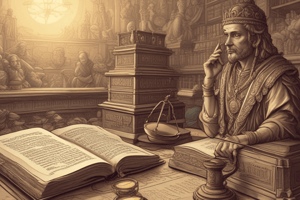Podcast
Questions and Answers
Define philosophy of law.
Define philosophy of law.
Philosophy of Law (also called jurisprudence), branch of philosophy that investigates the nature of law, especially in its relation to human values, attitudes, practices, and political communities. Traditionally, philosophy of law proceeds by articulating and defending propositions about law that are general and abstract x x x. Philosophy of law often aims to distinguish law from other systems of norms, such as morality (see ethics) or other social conventions.
What is the oldest law? Explain this law.
What is the oldest law? Explain this law.
The Code of Ur-Nammu (c. 2100-2050 BCE) is the oldest extant (existing, present, living) law code in the world. “Ur-Nammu” presenting himself as the father of his people, encouraged his subjects to think of themselves as one family and of his laws as the rules of a home. Punishments, except for capital offenses, took the form of fines in the same way a child might be deprived of a favorite pastime or toy for misbehaving. Ur-Nammu issued the code with the understanding that his people knew how to treat each other with respect and a fine for lapses would serve as a reminder.
What is the second oldest law? Explain this.
What is the second oldest law? Explain this.
The Code of Hammurabi was a set of 282 laws inscribed in stone by the Babylonian king Hammurabi (r. 1795-1750 BCE) who conquered and then ruled ancient Mesopotamia (now Iraq). The laws address business contracts and proper prices for goods as well as family and criminal law. Every crime inscribed on the stele is followed by the punishment to be inflicted. No one could claim they were ignorant of the law as the over seven-foot-tall stele was erected publicly. At the top, it was engraved with an image of Shamash, the god of justice, handing the laws to Hammurabi and the following text makes clear that these are laws of the gods, not arbitrary rules created by mortals.
What does Sharia stand for?
What does Sharia stand for?
Law is necessarily subject to a procedural morality consisting of eight principles. Choose the correct principles. (Select all that apply)
Law is necessarily subject to a procedural morality consisting of eight principles. Choose the correct principles. (Select all that apply)
Which of the following are types of secondary rules that mark the transition from primitive forms of law to full-blown legal systems? (Select all that apply)
Which of the following are types of secondary rules that mark the transition from primitive forms of law to full-blown legal systems? (Select all that apply)
Legal moralism is the view that the law can legitimately be used to prohibit behaviors that conflict with society's collective moral judgments, even when those behaviors do not result in physical or psychological harm to others.
Legal moralism is the view that the law can legitimately be used to prohibit behaviors that conflict with society's collective moral judgments, even when those behaviors do not result in physical or psychological harm to others.
According to the separation of Church and State, the government can establish a national religion funded by the taxpayers.
According to the separation of Church and State, the government can establish a national religion funded by the taxpayers.
The Filipino Constitution prohibits same-sex marriage explicitly.
The Filipino Constitution prohibits same-sex marriage explicitly.
What are five justifications for punishment, as discussed in the text?
What are five justifications for punishment, as discussed in the text?
Explain the retributive justification for punishment.
Explain the retributive justification for punishment.
Explain the deterrence justification for punishment.
Explain the deterrence justification for punishment.
Explain the preventive justification for punishment.
Explain the preventive justification for punishment.
Explain the rehabilitative justification for punishment.
Explain the rehabilitative justification for punishment.
Explain the restitutionary justification for punishment.
Explain the restitutionary justification for punishment.
Flashcards
Flashcards
Flashcards
A learning tool that uses small cards with terms and definitions to aid in memorization.
Learning Tool
Learning Tool
Anything used to help someone learn.
Memorization
Memorization
The act of remembering or recalling information.
Key Concepts
Key Concepts
Signup and view all the flashcards
Simple Explanations
Simple Explanations
Signup and view all the flashcards
Educational Value
Educational Value
Signup and view all the flashcards
Non-instructional Content
Non-instructional Content
Signup and view all the flashcards
Junk Content
Junk Content
Signup and view all the flashcards
Atomic Concepts
Atomic Concepts
Signup and view all the flashcards
Testing Effect
Testing Effect
Signup and view all the flashcards
Study Notes
Philosophy of Law
- Philosophy of law, also called jurisprudence, investigates the nature of law in relation to human values, attitudes, practices, and political communities.
- It aims to distinguish law from other norms like morality or social conventions.
Oldest Law
- The Code of Ur-Nammu (c. 2100-2050 BCE) is the oldest extant law code.
- Ur-Nammu presented the code as rules for a family, emphasizing community rules rather than individual punishments.
- Punishments were mostly fines, reflecting an understanding that people knew how to treat each other with respect.
Second Oldest Law
- The Code of Hammurabi (r. 1795-1750 BCE) was a set of 282 laws inscribed in stone.
- It covered business contracts, proper pricing, family law, and criminal law.
- Each crime and corresponding punishment were recorded on the stele, making them publicly known.
- The laws were considered divinely inspired, from the god Shamash.
Ethical Guidelines
- The text mentions the Golden Rule, Silver Rule, and Bronze Rule, but does not specify their details.
Sharia
- Sharia is Islamic or sacred law.
- It is an Arabic word meaning "the way" or "the path to water."
Procedural Morality of Law
- Law is subject to a procedural morality consisting of 8 principles:
- Rules must be expressed in general terms.
- Rules must be publicly promulgated.
- Rules must be prospective in effect.
- Rules must be in understandable terms.
- Rules must be consistent with each other.
- Rules must not require conduct beyond the powers of affected parties.
- Rules must not be changed too frequently.
- Rules must be administered consistently with wording.
Secondary Legal Rules
- Three types of secondary rules mark the transition to full-blown legal systems:
- Rule of recognition: identifies rules as part of the legal system.
- Rule of change: enables a society to add, remove, or modify laws.
- Rule of adjudication: establishes a mechanism to determine when rules have been violated.
Legal Moralism
- Legal moralism is the view that law can legitimately be used to prohibit behaviors that clash with societal moral judgments.
- It allows restricting individual freedoms based on collective morality.
Separation of Church and State
- The government cannot establish a national religion funded by taxpayers.
- This separation is guaranteed by the constitution.
Philosophy of Religious Provisions
- A society should not be forced to worship a single God.
- Religion should be protected from government interference or discrimination.
Justifications for Punishment
- Punishment justifications include:
- Retributive: Punishment in proportion to the crime, focusing on the wrongdoer.
- Deterrence: Punishment discourages further crimes.
- Preventive: Punishment prevents further crimes by the same individual.
- Rehabilitative: Punishment aims to reform the wrongdoer.
- Restitutionary: Compensation for victims of wrongdoing.
Studying That Suits You
Use AI to generate personalized quizzes and flashcards to suit your learning preferences.




